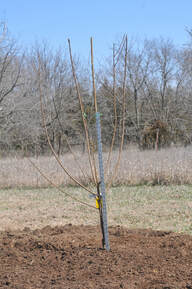Start Trees Off Right

1. Bare soil maintained with herbicides.
2. Area under tree mulched 3 inches deep.
3. Tall fescue allowed to grow under tree.
4. Bermudagrass allowed to grow under tree.
5. Kentucky bluegrass allowed to grow under tree.
All treatments were applied to Eastern redbud seedlings as well as to pecan seedlings. All trees were fertilized according to recommendations and watered during the growing season with up to 1 inch of water if rainfall was deficient. At the end of two years, trees were measured and harvested. Data was taken on caliper (diameter) 6 inches above the ground, weight of aboveground portions of the tree, leaf area, and leaf weight. There were no differences in any measure between the mulched treatment and the bare soil treatment for either tree species. All measures showed significant growth increases if lawn grasses were controlled around the tree.
Results include the following:
1. Caliper: Caliper measures 6 inches above the soil surface were twice as large for plots without grass than for those with either fescue or bluegrass, but only 50% larger when compared to the bermudagrass plots.
2. Top growth weight: Redbuds showed a 300% weight advantage for plots with grasses controlled than those without. Pecans showed a significant 200% increase.
3. Leaf area and leaf weight: Leaf areas were 200% larger in plots without grass competition and leaf weight showed a 300% increase.
The obvious conclusion from this study is that grasses must be controlled under a newly transplanted tree to get the best possible growth. Though there were no differences in growth whether mulch was used or not, you may still wish to mulch for aesthetic reasons or to help control weed growth. How far from the trunk should the grasses be controlled? Try a minimum of 3 feet.



Leave a Reply
You must be logged in to post a comment.